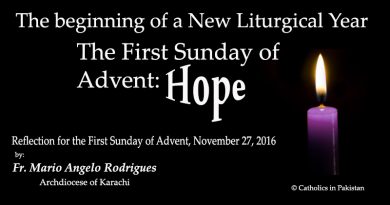We must continue as Jesus Christ to love our neighbours, Fr. Indirias Rehmat
Fr. Arthur Charles
KARACHI: The yearlong Year of Mercy closed on the eve of the Feast of Christ the King, at St. Patrick’s High School, Karachi on Saturday, 19 November 2016, with a programme organised by Catechetical Centre, Karachi – an organisation of the Roman Catholic Archdiocese of Karachi responsible for the religious education and formation of the faithful.
The Centre put Pope Francis’ vision for the Year of Mercy into practice through its programmes and activities. There were as many as 20 larger events which were organized by the Catechetical Centre throughout the year mainly for youth, parents, catechism teachers, catechists, teenagers, deacons, priests, religious and children.
Keeping in view the Feast of Christ the King and approaching Advent Season – time for preparation of the Birth of Lord Jesus Christ – the venue was adorned with buntings and colourful posters, meaningful decorations and flexes bearing festival’s highlights. People from all age groups, especially the youth numbering over 900 from all the parishes of the Archdiocese of Karachi enjoyed being part of the closing activities.
Rev. Dr. Indirias Rehmat, a renowned Moral Theologian and Academic Dean of National Catholic Institute of Theology, Karachi (NCIT) was the Guest of Honour. He inaugurated the closing programme.
Speaking at the occasion Dr. Indrias Rehmat said he felt honoured to attend the event. “It was a great programme. I know people love the events of Catechetical Centre. Its programmes are indeed in line with overall cultural situation in which we live. Therefore, they appeals to the people and help them to bring about much needed improvement in their own lives and in the society.”
Fr. Rehmat said that as the Year of Mercy ends, we must place the commitment resulting from this year in which we have lived with faith the extraordinary Jubilee of Mercy. We must continue – as Jesus Christ our Lord – to love sinners, the poor, the sick, and the marginalized.
“As this Year of Mercy is ending and the door closes, God opens a window. Let us leave this window open to the mercy that this year has allowed us to experience – not only so that we may experience the mercy of God, but so that we can show mercy to others,” said Fr. Rehmat.
Fr. Arthur Charles, director of Catechetical Centre, Karachi, a person who holds a doctorate in Dogmatic Theology and has many responsibilities in the Archdiocese. He lectures in various Catholic Institutes. Because of his timely initiatives in mass media, he is acclaimed as Father of Christian Media [Baba-e-Masihi Media] in the county. In his welcome address he thanked St. Paul’s – the biggest parish of the Archdiocese of Karachi – for its generous support in holding the programme.
He said that over the year, they have had many programmes in connection with the Year of Mercy. He had a firm belief in the fact that faith development and growth was the prime aim and object of the CCK. He said The Year of Mercy was an occasion to help people recognize how merciful God has been to them and, then, in effect, he commissioned all Catholics to be missionaries of mercy.
Earlier, a praise and worship segment was led by a group from St. Paul’s Parish. Another group explained the signs and symbols used during the Advent and Christmas times.
One of the foremost components of the festival was dramatization of two Parables of Jesus Christ: The Parable of the Unforgiving Servant [Matthew 18:21-35] and The Healing of a Boy [Mark 9:13-28] which the audience appreciated.
The plays were deeply rooted in the cultural situation, values and traditions of the land. They gave a perspective to understand the pain and suffering of people and encouraged the audience to be always ready to support and help people in need. The dramas also portrayed the universal message of Jesus Christ of peace, love, harmony and tolerance.
In the Catholic Church Ordinary Jubilees occur every 25 or 50 years, and Extraordinary Jubilees are called for some momentous occasion. Two extraordinary jubilees were called in the 20th century – 1933, to mark the 1900th anniversary of Christ’s redemption in 33 A.D., and 1983, its 1950th anniversary.
St. John Paul II also held a “Great Jubilee” in the year 2000, marking the 2000th anniversary of Jesus’ birth and the start of the new millennium.
At the start of the Jubilee of Mercy, during a general audience December 9, Pope Francis asked pilgrims, “Why a Jubilee of Mercy? What does this mean?”
The answer, he said, is because “the Church needs this extraordinary moment. I’m not (just) saying ‘it’s good,’ no! I’m saying: the Church needs it.”
The Holy Father’s constant refrain during the Year of Mercy, which began December 8, 2015, was that no one is excluded from the mercy of God, who has shown his love for each person by sacrificing his son for the salvation of all. All can be forgiven, the pope taught over and over again. And once a person experiences just how loving and merciful God has been, the obligation is to reach out to others with that same love and mercy.





